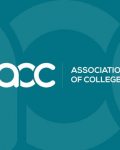- About us
- About colleges
-
Corporate services
- Corporate services
- Mental health and wellbeing
- AoC Student Engagement Charter
- Data Protection/GDPR
-
Employment Services - college workforce
- Employment Services - college workforce
- Employment: How we support members
- Introduction & Employment Helpline
- Absence & Sickness Management
- Contracts and T&Cs
- Disciplinary, Capability, Grievance & Harassment
- Equality, Diversity & Inclusion
- General Employee Relations & HR Issues
- Holiday/annual leave related
- Industrial Relations
- ONS reclassification related guidance
- Pay & Pensions
- Recruitment
- Redundancy, Restructuring & TUPE
- Safeguarding/Prevent
- Workforce Benchmarking, Surveys & Research
- Governance
-
Projects
- Projects
- Get Involved!
- Resources
- Contact the projects team
- Apprenticeship Workforce Development (AWD) Programme
- Creating a Greener London – Sustainable Construction Skills
- The 5Rs Approach to GCSE Maths Resits
- Creative Arts in FE 2025 – developing student voice through creativity
- Digital Roles Across Non-digital Industries
- GCSE Resits Hub Project
- Pears Foundation Youth Social Action Programme: Phase Two
- Pears Youth Social Action Programme - phase three
- T Level and T Level Foundation Year Provider Support Programme
- T Level Professional Development (TLPD) Offer
- The Valuing Enrichment Project
- Film London - Metro London Skills Cluster
- Empowering FE: enhancing skills with technology
- Resources/Guidance
- Sustainability & Climate Action Hub
- Partnerships
- Honours Nomination
- Brexit
- Ofsted Inspection Support
- AoC charters
- Recruitment and consultancy
-
Events and training
- Events and training
- Events
- T Level and T Level Foundation Year Events
- Events and training: How we support members
- Network Meetings
- Previous Events and Webinars
- In-House Training
- Senior Leadership Development Programme
- Early Career and Experienced Managers' Programme
- Sponsorship and Exhibition Opportunities
- Funding and finance
-
Policy
- Policy
- Meet the Policy Team
- Policy: How we support members
- Policy Areas
- Policy Briefings
- Submissions
- Policy Papers & Reports
- AoC 2030 Group
- AoC Strategy Groups
-
AoC Reference Groups
- AoC Reference Groups
- 14-16 Reference Group
- 16-18 Reference Group
- Adults (inc. ESOL) Reference Group
- Apprenticeship Reference Group
- EDI Reference Group
- HE Reference Group
- HR Reference Group
- International Reference Group
- Mental Health Reference Group
- SEND Reference Group
- Sustainability & Climate Change Reference Group
- Technology Reference Group
- WorldSkills Reference Group
- Opportunity England
- Research unit
-
News, campaigns and parliament
- News, campaigns and parliament
- Colleges Week 2025
-
Mission accepted
- Mission accepted
- Mission accepted: case studies
- Mission one: kickstart economic growth
- Mission two: make Britain a clean energy superpower
- Mission three: take back our streets
- Mission four: breaking down barriers to opportunity
- Mission five: build an NHS fit for the future
- Mission accepted resources
- Election resources
-
Comms advice and resources for colleges
- Comms advice and resources for colleges
- Media relations: 10 ways to build effective relationships with the media
- How to choose a PR agency
- Legal considerations for communications and media work
- How to plan for a new build
- Crisis communications: your go-to guide
- How to handle photo consent for media and marketing
- How to evaluate a PR and media campaign
- How to react to regulation, funding and restructuring issues
- How to react quickly and effectively to the media
- Working with the media: a complete guide
- How to write a compelling case study
- How to write for the web
- Communications, marketing and campaigns community
- AoC Newsroom
- AoC Blogs
- College case studies
- Work in Parliament
- AoC Campaigns
- Briefings
- Communications, media, marketing and research: How we support members
-
Equality, diversity and inclusion
- Equality, diversity and inclusion
- Equality, diversity and inclusion blogs
- AoC’s Equity, Diversity and Inclusion Charter
- AoC’s Equity, Diversity and Inclusion Charter for further education sector organisations
- AoC’s Equity, Diversity and Inclusion Charter signatories
- Diversity in Leadership
- Black FE Leadership Group and AoC partnership agreement
- AoC's Equity Exchange
- Equality, diversity and inclusion: how we support members
- Equality, diversity and inclusion case studies
- ETF Inclusive Leadership Coaching Programme
- Equality, diversity and inclusion briefings
- AoC Sport Diversity and Inclusion Action Plan
- Home
- Policy
- Policy Areas
- Special Educational Needs and Disabilities (SEND)
SEND

Rethinking SEND
Our recent blog series examines the challenges within the SEND system, explores potential reforms and evaluates whether changes could unintentionally undermine the effective practices that exist in colleges.
SEND Services
We provide support and advice to colleges through our member services. These include:
AoC represents colleges by working with:
- Department for Education (DfE) officials who have responsibility for the Children and Families Act (2014), national implementation of the changes to the SEND system, and supported Internships
- Other Government and local authority officials involved in implementing changes to the SEND system
- Education and Skills Funding Agency (ESFA) officials who have responsibility for the changes to high-needs funding and implementation of the new processes, and for student support for mainstream students
- The Special Education Consortium (SEC) – a cross-sector body representing the needs of children and young people with SEND and their families.
The AoC SEND Reference Group provides a forum to work with Government Departments, agencies and partner organisations on policy formation and implementation issues.
SEND Reference Group
ILR data shows that in 2022/23, 29.9% of students with 16 to 18 funding had learning difficulties and disabilities (LDD), higher than the corresponding figure in schools (17.3%). It also shows that around 18% of adult college students have LDD. Colleges enable positive destinations for this diverse group of students, where nearly threequarters (73.5%) of students completing 16 to 18 study in 2022/23 sustained education, apprenticeship, or employment.







